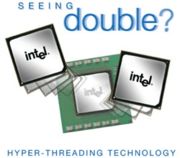Hyperthreading & Dual-Core Processors
By nicestuffz
@nicestuffz (205)
Philippines
January 21, 2007 1:54am CST
This cutting edge technology was already introduced to us by leading processor manufacturers like Intel and AMD. But behind this technology, what is their difference? and if ever you would choose a processor this technology, which one would you prefer?
2 people like this
7 responses
@shrikant3 (122)
• India
22 Jan 07
well hyper threading tech. gives you the virtual experience of two processors........and belive me,your computer works really better when you have a HT built in it...on the other hand the dual core is nothin but the two two processors givin' you a little bit more experience than that of HT...nothin else...
the main mind-blowin processor is core 2 duo processor of intel...its much different than that of dual core...many people take that dual core and core 2 duo are one and the same,but core 2 duo gives you the power of 4 processors....
its also called as the "quad" processor...
so i'd defenitely prefer core 2 duo extreme for my optimum performance...
3 people like this
@nicestuffz (205)
• Philippines
23 Jan 07
Thanks for the input. I will try to analyze this two things deeply. And buy the right one for me.
1 person likes this
@lameran (1147)
• Indonesia
23 Jan 07
Hyper threading is not dual core processor .. its only using single core processor .. but its emulated so its works like dual core ... so the processor will be more effectivelly used ... since its still single core .. so .. you can describe it ...
dual core means in one single die processor contain two cores ... in multitasking it will great achieve ..
cmiiw
3 people like this
@aelyus (634)
• Romania
23 Jan 07
i think dual core means that in a single processor "box" are 2 phisical cores which runs in the same frequency. hyperthreading technology creates 2 virtual cores, so an Intel Core 2 Duo have 2 phisical + 2logical cores, giving us high performance/watt
@usman400 (1587)
• Pakistan
21 Jan 07
I will always prefer intel however the difference is simply ur pc's speed will be boost up, and ur processor can be changed like v can change RAM's u get money, u purchase a processor, just replace it with older one or both
@Mikaelo (191)
• Philippines
22 Jan 07
The difference between Hyper-Threading and Dual Core processing is that in Hyper-threading, there is a slight parallelism in terms of executing commands. While in Dual Core processing, there is True Parallelism. When we say true parallelism, the execution of commands are done exactly at the same time compared to hyper-threading which is done almost, take note, almost at the same time.
I've been using the Pentium D in my system, it the first dual core processor made by Intel. I'd say it's not that good compared to the Core 2 Duo processors.
Comparing AMD and Intel, for now I'd go for Intel since they produced the best processor of the year...the Core 2 Duo series aka the Conroe.
But in terms of price and performance, specially when it is to be used in gaming, I'd still go for AMD.
2 people like this
@Mitch_Miyaka (797)
• Philippines
23 Jan 07
Currently im using Intel and its almost 1 year already. Still in good condition and no hardware error happens yet. Compare to AMD, lately we use AMD for gaming but now they are all broken. YUp its true that AMD have good performance than Intel. AMD lifespan are too little, takes only 1-3 years.
2 people like this
@nicestuffz (205)
• Philippines
23 Jan 07
In terms of difference between Intel and AMD processors. I will also prefer Intel. The only problem is the price, AMD is much cheaper than Intel. But Intel would be very good for a long time investment.
1 person likes this
@myl0taldwin (416)
• Philippines
23 Jan 07
I prefer dual-core. It's like having two computers all in one. But if you have less budget for a computer and the use of that computer is for simple office work only, why buy an expensive dual-core if I can buy a hyperthreading more economical that the other.
@Fareast187 (104)
• Malaysia
27 Jan 07
i prefer Hyper-threading It is a more advanced form of Super-threading that debuted on the Intel Xeon processors and was later added to Pentium 4 processors. The technology improves processor performance under certain workloads by providing useful work for execution units that would otherwise be idle, for example during a cache miss. A Pentium 4 with Hyper-Threading enabled is treated by the operating system as two processors instead of one.












